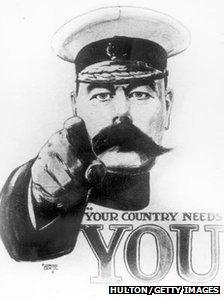WW1 brothels: Why troops ignored calls to resist 'temptation'
- Published

Around 400,000 cases of venereal disease were treated during the course of the war
When British soldiers set off for the trenches in 1914, folded inside each of their Pay Books was a short message. It contained a piece of homely advice, written by the Secretary of State for War, Lord Kitchener.
"In this new experience you may find temptations both in wine and women. You must entirely resist both."
In his memoirs Private Frank Richards, who served continuously on the Western Front, recorded men's responses to these words:
"They may as well have not been issued for all the notice we took of them."
Visiting prostitutes is a little-known and little-discussed aspect of life on the Western Front, but it was a key part of the British soldiers' war experience.
Licensed brothels had existed in France since the mid-19th Century - the war saw the trade flourish.
'Not monks'
"Immorality in Boulogne is as prevalent as death in the line," recorded Brig Gen Frank Percy Crozier, who arrived on the Western Front in 1915.
''Rouen has been ruinous to my purse (not to mention my morals)," confided James H. Butlin, a lieutenant who, in 1914, swapped his place at Oxford University for one in the trenches.
"But I have enjoyed myself," he confessed.
Brothels displayed blue lamps if they were for officers and red lamps for other ranks.
Outside red lamp establishments, queues or crowds of men were often seen.
Cpl Jack Wood compared the scene he witnessed to "a crowd, waiting for a cup tie at a football final in Blighty".
Others saw brothel visits as a physical necessity - it was an era when sexual abstinence for men was considered harmful to their health.
Lt R. G. Dixon explained in his memoir: "We were not monks, but fighting soldiers and extraordinarily fit, fitter than we had been in our young lives, and fairly tough - certainly with an abundance of physical energy.
"If bought love is no substitute for the real thing, it at any rate seemed better than nothing. And in any case it worked off steam!"
'Presence of death'
Physical need made it more acceptable for married men, rather than single men, to visit prostitutes.
Cpl Bert Chaney, while he surveyed a queue of soldiers outside one red lamp brothel, was told by those who waited in line "these places were not for young lads like me, but for married men who were missing their wives".
Brothels were also places where soldiers went to spend what could be their final mortal hours.
Twenty-four hours before the major British offensive of the Battle of Loos, Pte Richards saw "three hundred men in a queue, all waiting their turns to go in the Red Lamp".

The famous recruiting poster
Lt Dixon described how "we were consistently in the presence of death, and no man knew when his turn might come.
"I suppose that subconsciously we wanted as much of life as we could get while we still had life."
The war poet, Capt Robert Graves, recorded how this life experience was particularly urgent for some: "There were no restraints in France; these boys had money to spend and knew that they stood a good chance of being killed within a few weeks anyhow.
"They did not want to die virgins.'
Brothel visits could also be a way to avoid death.
They gave soldiers a chance to swap time in the trenches for a few weeks in a hospital bed.
According to Gunner Rowland Myrddyn Luther, who enlisted in September 1914, and served through to the Allied advance of 1918, a great many soldiers were prepared to chance venereal disease, rather than face a return to the front.
'Belonged to war'
"The total number thus infected must have been stupendous, both officers and men alike.
"In fact the contraction of such a disease seemed sought after, even if only to keep a man from the front during treatment."
The numbers infected were indeed quite "stupendous".
Around 400,000 cases of venereal disease were treated during the course of the war.
In 1916, one in five of all admissions of British and dominion troops to hospitals in France and Belgium were for VD.
But, succumbing to the temptation Kitchener had warned against was, for many, confined to the extraordinary circumstances of war.
For Lt Dixon "the business was compartmentalised - it was, as it were, shut off from normal human relationships, and belonged to this lunatic world of war and to nowhere else."
The visits of Tommies and their officers to brothels are unlikely to receive attention in the World War One centenary, but they should.
Pte Percy Clare included "the subject" in his memoir because he was "writing faithfully of our life in France".
As he summed it up "it is better to know the truth".
- Published28 February 2014